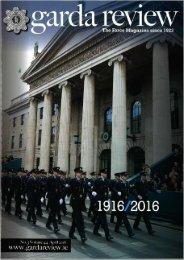Conference Report 2016
Table of contents contains links on page 5. It can be used to skip through chapters.
Table of contents contains links on page 5. It can be used to skip through chapters.
Create successful ePaper yourself
Turn your PDF publications into a flip-book with our unique Google optimized e-Paper software.
Section 1: Pay and Allowances<br />
PART ONE: OuTlINE SummARy<br />
1.1 Any review of industrial relations cannot<br />
meaningfully proceed without the establishment of<br />
fundamental parameters. In the first instance that<br />
means to establish the number of gardaí needed to<br />
police Ireland. To answer this, we also need to<br />
clearly define the role and function of An Garda<br />
Síochána through extensive policing plans for each<br />
garda division and subsequently quantify the<br />
number of personnel required to fulfil the objectives<br />
and also provide contingency for omissions,<br />
absentees and the unpredictable nature of policing.<br />
1.2 Numerous agencies have outlined the need for<br />
clearly stated and verifiable data on the nature of<br />
policing in Ireland. The Garda Representative<br />
Association (GRA) has long contended that an<br />
optimum number survey should be researched and<br />
compiled by an independent authority utilising the<br />
latest academic theory and methodology. A<br />
consultative document should be produced,<br />
distributed, discussed and implemented within the<br />
lifetime of the next Dáil.<br />
1.3 Our position is clear; gardaí cannot be expected to<br />
deal with ever-expanding workloads as their<br />
numbers diminish. A defined policing function will<br />
determine the numbers of workers required to<br />
satisfy the requirements of the public against<br />
attainable productivity levels and contingencies for<br />
each garda. The situation is currently untenable.<br />
The policing plans are not covered and the policing<br />
service has become inconsistent. The first question<br />
that needs to be answered is: how many gardaí are<br />
needed to fulfil the role and function of An Garda<br />
Síochána?<br />
1.4 There is no doubt that our members are more<br />
vulnerable to becoming victims of crime too. An<br />
Garda Síochána has had its membership reduced by<br />
around 2,500 since 2011 through retirements, long<br />
term illness and incentivised career breaks. This<br />
equates to one in six; to around five million policing<br />
hours lost per annum and yet various reform and<br />
transformation has required the remaining serving<br />
members to take measures to absorb this loss while<br />
providing an enhanced policing service.<br />
1.5 We must question the model of governance that can<br />
promote such a policy. History will undoubtedly<br />
expose this folly, but in the present situation this<br />
remains untenable in real policing. The current<br />
reclassified crime figures [September 2015] support<br />
this position. The explanation that Ireland had<br />
bucked worldwide trends in recorded crime<br />
because of ‘smart policing’ or ‘intelligence-led<br />
policing’ have been unmasked as political rhetoric<br />
designed to mislead the public and placate the everincreasing<br />
number of crime victims.<br />
1.6 In the search for a quantifiable solution to such a<br />
question, the individual level of risk to which each<br />
member is to be exposed will have to be quantified.<br />
Until now, it appears that the authorities are<br />
prepared to accept that being assaulted or<br />
subjected to intimidation is to be regarded as an<br />
occupational hazard. This is no longer accepted in<br />
the ways of the past. A modern police officer has<br />
every right to the benefit of State protections; and<br />
as an employer the State has a duty of care for each<br />
employee. The derived level of personal risk that<br />
each garda is assigned must be reflected in<br />
remuneration to compensate for any heightened or<br />
uncertain risk; public opinion now appears to reflect<br />
this. Few employments require the wearing of an<br />
anti-stab or an anti-ballistics vest as basic, standard<br />
safety equipment.<br />
1.7 In the event that specific issues arise for<br />
consideration for revision, the Association adjudges<br />
that it will be in the ultimate interests of all parties<br />
(and entirely appropriate in the context of<br />
‘partnership’ and ‘joint decision making’ processes)<br />
that it be invited to make supplementary<br />
submissions, serving to assess the implications of<br />
any proposed revisions. During the recent pay<br />
reductions resulting from the global economic crisis,<br />
coupled with deteriorating employment conditions,<br />
the Association contained the anger,<br />
disillusionment and sense of betrayal felt by our<br />
members, and steered a path that avoided industrial<br />
action but has resulted in our members frustration.<br />
We now require meaningful engagement to become<br />
tangible improvement in morale, optimism and<br />
enthusiasm. Our members need hope.<br />
1.8 In recent years the Association’s membership has<br />
been subject to increasingly oppressive financial<br />
pressures with more demanding workloads set in<br />
decreasing and deteriorating resources. The<br />
massive contribution of An Garda Síochána to the<br />
current economic recovery should not go unnoticed<br />
or without acknowledgement.<br />
1.9 Data provided to the Association by the Minister for<br />
Justice and Equality (August 2014) demonstrated<br />
that the budget allocation to An Garda Síochána<br />
dropped from €1,577,538,000 in 2008 to<br />
€1,239,488,000 in 2014 – a decline of over 21%.<br />
Data provided to this Association by the Garda<br />
Commissioner’s office in September 2014 showed<br />
that the gross expenditure for the total pay bill for<br />
An Garda Síochána declined by over 12% over the<br />
38th Annual Delegate <strong>Conference</strong><br />
13




